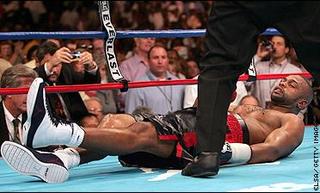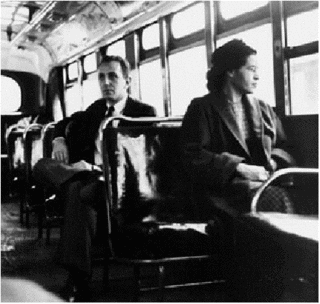
Did Roy Jones Con The Boxing Public?
By El-Veasey
Copyright 2005 El-Veasey Publishing
Roy Jones was probably one of most skilled boxers of his era but he’s not in the class of the great fighters, like Sugar Ray Robinson, Joe Louis, Rocky Marciano, Ray Leonard, Roberto Duran, Tommy Hearns, Marvin Hagler etc, because he appeared to be afraid to challenge himself by facing fighters who were tough and could punch, like Gerald McClellan [before he got hurt], Nigel Binn, Chris Eubanks, Stevie Collins or Julian Jackson. He was never willing to give Hopkins or Tony rematches or Eric Harding who was giving him a challenge until he hurt his shoulder late in their fight. He seemed content to just maintain his sweetheart deal with HBO, where he could make millions fighting weak competition and meaningless, non-challenging mandatories.
After Gerald McClellan got seriously hurt in the ring, I think that made Jones even more afraid of getting hurt and ending up in McClellan’s condition; and in a sense I can't blame him; but if he was afraid of getting hurt he should've gotten out of the game, but, on the other hand why should he, when he could look brilliant and make millions fighting weak opposition?
One rationalization used by Jones fans to account for his choosing to face weak opposition, is that it's not Jones’ fault that he was boxing in an era with weak opposition; that may be partly true, but as alluded to earlier, he was never willing to call out the more dangerous opponents in his division or the ones above it to test himself against. Jones was probably one of the most skilled boxers of his era but didn't he make himself look even more spectacular by choosing to fight low risk opponents he knew he could beat and look spectacular against?
Jones' fans try to excuse Roy's knockout lost to Tarver by saying he had to lose too much weight when he went back to light heavyweight. Buddy Mcgirt, Tarver's trainer, said that Tarver come to training camp for that fight weighing around 212 pounds, Jones only weighed 190 something. So Tarver had to lose more weight than Jones did (but his defenders aren’t concerned about how much weight Tarver had to lose, only with defending their hero).
Another excuse his fans use is that Jones has been fighting so long he got old overnight, that Tarver hasn't been fighting as long as Jones so he's fresher than Jones; More bull and denial. One of the reasons Jones’ defenders say he's so great is that he's never taken punishment in his fights, so how can he be worn out? Jones should be just a fresh as Tarver. The " he's got old overnight" excuse is just that, an excuse, because he and Tarver are the same age. So Rather than seeing that when Jones finally faced real competition, Jones struggled and then got knocked out twice (by Tarver and Glen Johnson) or giving Tarver or Johnson credit for their wins; they keep making excuses for Jones poor showing against Tarver in their first fight, knockout loss in their second and devastating knockout lost in the Johnson fight.
A big deal was deal was make about Jones being the second former middleweight champion to win the heavyweight title: but Jones winning the "heavyweight" title can't compare with Bob Fitzsimmons winning the heavyweight title. Fitzsimmons didn't have the option to "pick" which heavyweight champion he would face. There was only one heavyweight champion and that's whom he had to face. Jones on the other hand, picked the "champion" he wanted to face and the one he knew would be easiest for him to defeat, John Ruiz, whom most boxing analysts and fans viewed as a "paper" champion, the worst and least skilled of all the champions. So Jones’ title win can't be placed in the same category as Fitzsimmons' title win.
Another factor that may be considered as possible detraction from this win is a report that Jones tested positive for steroids after a fight with Richard Hall, a story which very few in the boxing media focused on. In the Ruiz bout, even though Jones weighed less than Ruiz he looked very muscular, like he had been pumping iron big time. He looked just as big as Ruiz or bigger. He couldn't take steroids and lose weight to fight Tarver and maybe that's part of reason why he didn't look as muscular, fast or strong against Tarver or Johnson. When Jones stated he lost to much muscle trying make the lower weight he may be right for the wrong reason.
If Jones showed by winning a heavyweight title that he was superior to all boxers no matter what weight class he fought in, why didn't he challenge Lennox Lewis, the recognized heavyweight champion for the title rather than the lightly regarded Ruiz? If he'd beaten Lewis, his win would have equaled Fitzsimmons', but he didn't challenge Lewis because he didn't want a real challenge. What he did want was a big money fight with a washed up Mike Tyson because he didn't view Tyson as a serious threat or that competitive anymore. But that fight didn’t happen. So rather than stay in the heavyweight division, defend his title and show his greatness by taking some serious challenges, he opted to go back to light heavyweight to face Tarver, who he didn't want to fight and had avoided fighting for years. But Tarver had publicly called him out and it was the only big money fight available to him (the lesser of two evils) as opposed to defending his title in a high-risk heavyweight fight (I read his mandatory may have been David Tua).
Remember, after Jones defeated the lowly regarded John Ruiz for his portion of the heavyweight title, Jones was considered unstoppable, one of the all time greats, maybe even better than Sugar Ray Robinson; but when he got knocked out twice in a row, he defenders were so shocked, they couldn't see or didn't want to see the message that was being delivered to them: when Jones faced real stiff competion he lost big time.
There is no doubt that Jones had exceptional skills as far hand speed, reflexes etc, but he made his skills appear to be even greater by choosing to fight opponents he knew he could beat because he was faster than they were, including policemen, garbage men, etc and meaningless mandatories when he could have chosen rematches with James Toney, Bernard Hopkins or even Eric Harding. Or he could have challenged the fighters I named earlier, Gerald McClellan, Nigel Binn, Chris Eubanks, Julian Jackson or Steve Collins, or take some serious challenges at heavyweight, but there was definitely more risk involve in fighting these guys or serious heavyweights than any of the fighters his faced in the last ten years, so he avoided those risks.
Did he con the boxing public?
As far as Jones conning the boxing public in his last lost to Tarver; he’s was conning the boxing public a long time before that fight. He’s just finally been found out. There have always been writers and fans that saw Jones as conning the boxing public, the way he conned HBO into paying him millions to fight nobodies and meaningless mandatories.
Yes he conned the fans and himself as well, that’s why he made all those excuses about his knockout loss to Tarver, he couldn’t believe it or didn’t want to believe it. His pride was hurt, he was in shock, traumatized and embarrassed. When HBO cameras went into his dressing room after the fight. Jones and his yes men were making comment about the knockout loss to soothe his ego like, "A scared man is a dangerous man!"(Referring to Tarver) "Yeah a scared man is a dangerous man!" It wasn’t that a better fighter knocked out Jones; he was just beaten by a scared fighter and everybody knows a scared fighter can get lucky and beat a good fighter anytime. This is how people talk when they’re experiencing psychological trauma and denial is use to lessen the shock and make it easier for them to deal with.
Jones is still in denial and conning himself but there are signs that even his defenders are starting to see through the con and their own denial and hero worship (superman myth) because it's so obvious now that even they can’t continue to deny the truth any longer, though they may wish to [some of them still try to give him more credit than he’s due].
Jones was a good fighter made to look even greater because of his speed, flashy style, HBO hype, avoiding tough competition and blinding hero worship by his fans; but he not in the class of the great champions who were willing to test their greatness by taking great challenges in the ring, like Robinson, Louis, Marciano, Duran, Leonard, Hearns, Hagler or a host of others.


